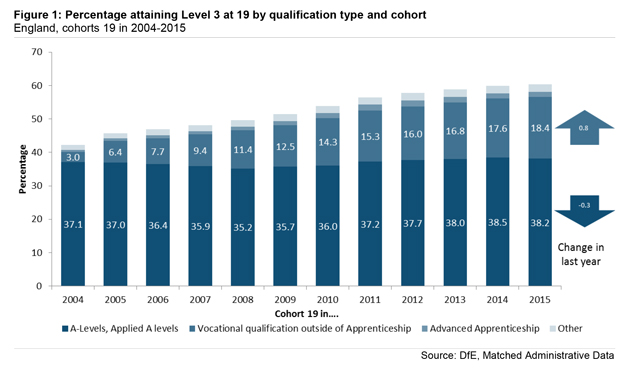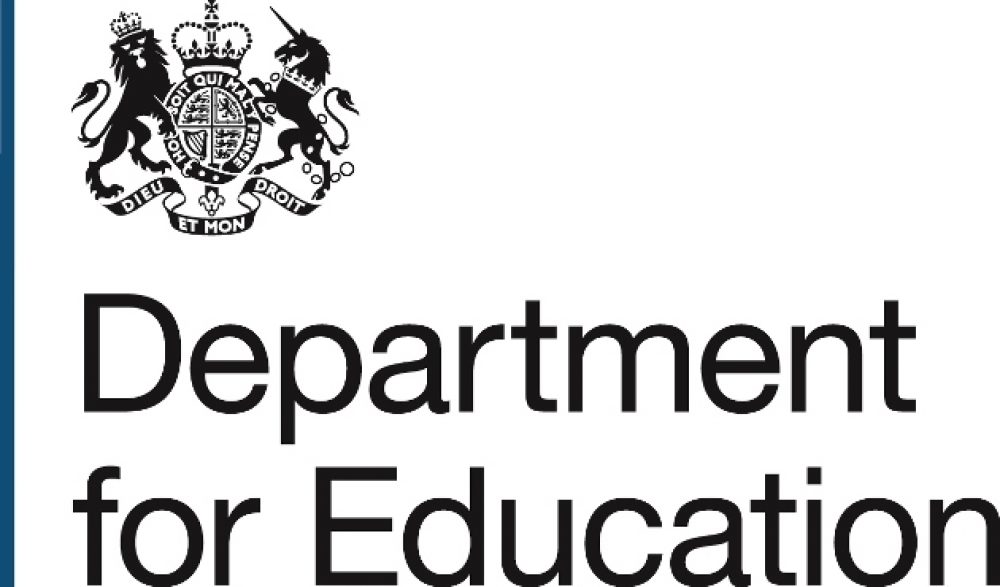The number of 19-year-olds gaining level three through A-levels has fallen for the first time in seven years, while the figures for those achieving the same standard through vocational routes continues to rise.
The proportion for A-levels fell by 0.3 per cent last year — the first drop since 2008, according to statistics published by the Department for Education (DfE) for level 2 and 3 attainment by age 19 in 2015.
In contrast, the figures for those gaining level three through vocational qualifications by age 19 rose by 0.8 per cent in 2015, to 18.4 per cent.
This represents an increase of over 15 per cent since 2004.
Responding to the results, David Corke, director of education and skills policy for the Association of Colleges, said: “The figures show that young people studying academic and vocational qualifications at level three are maintaining a good level of attainment.
“This demonstrates not only the hard work of the students but the quality of colleges’ teaching.”
The report, ‘Level two and three attainment in England: Attainment by age 19 in 2015’, also found that the number of students successfully gaining level two English and math by age 19 in England reached 70 per cent in 2015, up from 67.8 per cent in 2014.
The proportion of young people who had failed to achieve a level two qualification in English and maths at age 16, but had achieved both by age 19, also rose from 16.9 per cent in 2014 to 22.3 per cent in 2015.

Mark Dawe, incoming chief executive of the Association of Employment and Learning Providers, responded to these findings, saying: “The data for vocational qualifications is encouraging, especially in respect of the increases in attainment for English and maths.
“We believe the success in English and maths is thanks to learners being put on appropriate programmes for their learning and in particular functional skills at the core of work based learning provision.
“We will be making this clear to Sir Adrian Smith’s review of the feasibility of compulsory maths until 18, announced in the Budget.”
David Hughes, chief executive at the Learning and Work Institute, said: “It is encouraging to see overall attainment of level two English and maths rising and that achievement gaps are closing.”
But he added: “Far too many young people are still leaving compulsory education without these vital skills.”
The DfE report also showed an improved outlook for students eligible for free school meals (FSM), and those with special educational needs (SEN).
Some 71.9 per cent of students eligible for FSM at 15 had achieved level two by age 19 in 2015, compared to 88.4 per cent of those that were not.
This was a small rise on 2014, when 71.3 per cent of those on FSM at 15 had achieved Level 2 by age 19, compared to 87.9 per cent of those that were not.
For students with SEN at 15, nearly two thirds (65.7 per cent) achieved level two by the age of 19 in 2015 — 0.5 per cent higher than in 2014.
In comparison, 91.9 per cent of those without a SEN at 15 achieved this level, leading to an attainment gap of 26.2 per cent — 0.7 per cent smaller than last year.
A DfE spokesperson told FE Week: “We are clear that vocational and academic qualifications are equally important, but serve different educational purposes.
“We are reforming AS and A levels to be robust and rigorous, to match the best education systems in the world and keep pace with universities’ and employers’ demands. Our reforms also incentivise the take-up of those 16-19 vocational qualifications that are of high value and support progression to further study or a good job.
“It is important that schools and colleges provide students with high quality advice about their qualifications choices, including which qualifications will support their future education and career aspirations.”








Your thoughts